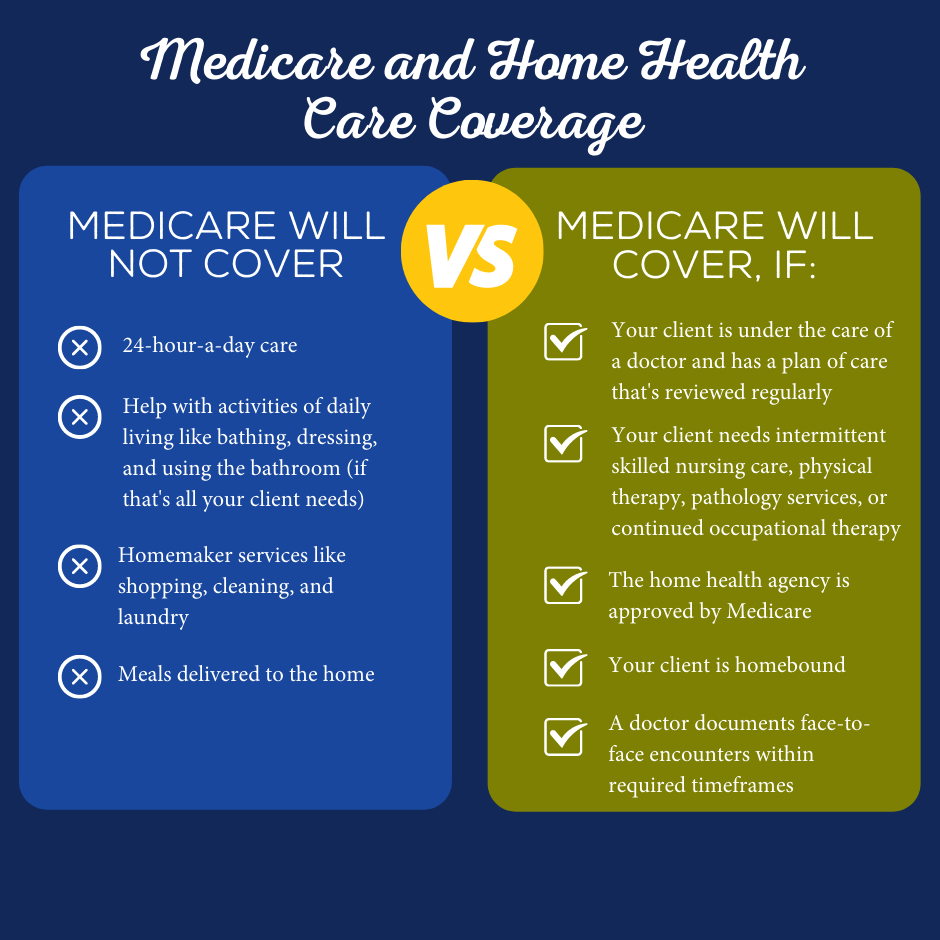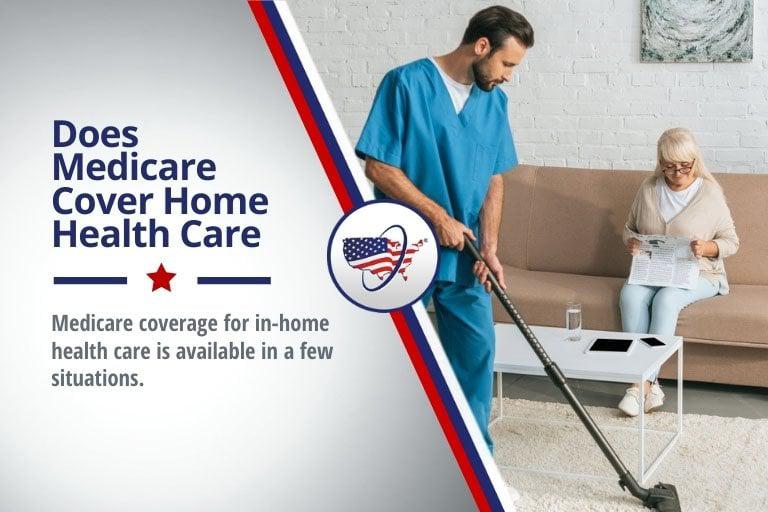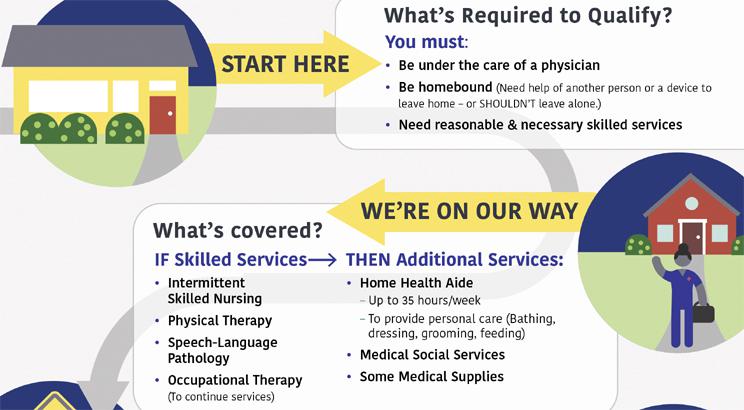Navigating healthcare options can often feel overwhelming, especially when it comes to understanding what Medicare covers. If you or a loved one requires home care, you're probably asking, "Is home care covered by Medicare?"
This is a crucial question, as home care services can greatly impact the quality of life and independence of those who need assistance. You deserve clear, straightforward answers to help you make informed decisions. We'll break down the complexities and provide the information you need to understand Medicare’s stance on home care.
Keep reading to uncover essential insights that could make a significant difference in your healthcare planning.
What Is Home Care?
Understanding whether home care is covered by Medicare can be confusing. Many people seek answers to this question, especially as loved ones age or face health challenges. Home care is a service designed to assist individuals in the comfort of their own homes. It provides support for daily activities and medical needs, aiming to enhance quality of life. But what exactly does home care involve? Let's explore.
Home care refers to a variety of services offered to individuals in their residences. It includes medical and non-medical assistance tailored to the needs of the individual. The primary goal is to ensure safety, independence, and improved health. Understanding these services can help determine if they meet your loved one's needs.
Home care services can be categorized into different types:
Personal Care: Assistance with bathing, dressing, and grooming.
Homemaking: Help with cleaning, cooking, and laundry.
Companion Care: Social interaction and support with daily activities.
Benefits Of Home Care
Home care offers numerous benefits, making it a preferred choice for many families:
Comfort: Receiving care in a familiar environment.
Personalized Care: Tailored services based on individual needs.
Independence: Maintaining autonomy in a home setting.
Who Needs Home Care?
Home care is suitable for individuals of varying needs, including:
Senior citizens requiring assistance with daily tasks.
Individuals recovering from surgery or illness.
People with chronic conditions needing ongoing support.

Types Of Home Care Services
Is home care covered by Medicare? Many people ask this question as they explore care options for themselves or their loved ones. Understanding the types of home care services can help clarify what Medicare may cover. Home care services offer essential support, allowing individuals to maintain independence while receiving necessary care at home. Let's explore the different types of home care services available.
Personal Care Services
Personal care services focus on daily activities. These include bathing, dressing, and grooming. Assistance with personal hygiene is crucial for individuals who struggle with these tasks. Caregivers also help with mobility, ensuring safety as individuals move around their homes.
Homemaker Services
Homemaker services support the household. Tasks include cleaning, laundry, and meal preparation. Maintaining a clean and organized home environment promotes health and well-being. These services ensure that the home remains a safe and comfortable space.
Physical Therapy
Physical therapy services help with recovery and mobility. Therapists work with individuals to improve strength and flexibility. Rehabilitation exercises support recovery from injury or surgery. Physical therapy aims to enhance overall physical function.
Occupational Therapy
Occupational therapy focuses on improving daily living skills. Therapists help individuals regain independence. They teach techniques to perform everyday tasks. Occupational therapy is vital for those with physical or cognitive challenges.
Speech Therapy
Speech therapy addresses communication and swallowing issues. Therapists assist individuals in improving speech and language skills. Therapists also work on swallowing difficulties, ensuring safe eating and drinking. Speech therapy enhances communication and quality of life.
| Service Type | Description |
| Personal Care | Assistance with daily activities like bathing and dressing. |
| Homemaker Services | Household tasks including cleaning and meal preparation. |
| Physical Therapy | Exercises to improve strength and flexibility. |
| Occupational Therapy | Improving skills for daily living tasks. |
| Speech Therapy | Assistance with communication and swallowing. |
Medicare Basics
Understanding Medicare is crucial for those exploring healthcare options, especially if you're considering home care services. Medicare is a federal health insurance program primarily for people aged 65 and older. It also covers certain younger individuals with disabilities. Knowing the basics helps you make informed decisions about your healthcare needs and coverage.
What Is Medicare?
Medicare is a government-run health insurance program. It consists of different parts, each offering specific types of coverage. These parts include Medicare Part A, Part B, Part C, and Part D. Each part covers different healthcare services, from hospital stays to prescription drugs.
Medicare Part A
Medicare Part A is often referred to as hospital insurance. It covers inpatient hospital stays, care in a skilled professional facility, hospice care, and some home health care services. Most people don't pay a premium for Part A if they or their spouse paid Medicare taxes while working.
Medicare Part B
Medicare Part B covers outpatient care, doctor services, and preventive services. It also covers some home health care services. Unlike Part A, you typically pay a monthly premium for Part B. This part is crucial for those needing regular medical care outside a hospital.
Medicare Part C (medicare Advantage)
Medicare Advantage Plans, or Part C, offer an alternative way to receive your Medicare benefits. These plans are offered by private companies approved by Medicare. They include all benefits and services covered under Parts A and B, often with additional services like vision or dental.
Medicare Part D
Medicare Part D is prescription drug coverage. This part helps cover the cost of prescription medications. You can add Part D to your Original Medicare or Medicare Advantage Plan. It's essential for those with regular medication needs.
How Medicare Works With Home Care
Medicare covers certain home health care services if you meet specific conditions. Services covered may include part-time or intermittent skilled physical therapy, speech-language pathology services, and medical social services. Home health aide services may also be covered if you qualify.
Medicare Part | Coverage Type |
Part A | Hospital insurance, some home health care |
Part B | Outpatient care, doctor services, some home health care |
Part C | Medicare Advantage Plans |
Part D | Prescription drug coverage |
Medicare is for people aged 65 and older.
Covers younger individuals with disabilities.
Home care services have specific coverage criteria.
Eligibility For Medicare Coverage
Understanding if home care is covered by Medicare is important for many families. It can affect their financial planning. The eligibility for Medicare coverage is not always clear. Knowing the rules and requirements can help individuals access the care they need. This section explores how you can determine if you qualify for Medicare's home care benefits.
Eligibility Criteria For Medicare Home Care
Medicare has specific rules for home care coverage. First, a doctor must certify that you need one or more of these services: skilled physical therapy, or speech-language pathology. This certification is the first step in ensuring your eligibility.
You must also be under the care of a doctor who reviews your care plan regularly. This ensures that the care you receive aligns with your medical needs. The care plan is an essential document that outlines your treatment goals and services.
Homebound Requirement
To qualify for Medicare home care, you must be homebound. This means you find it difficult to leave your home without help. Leaving home should require a significant effort, and outings should be rare. This requirement ensures that home care is necessary for your condition.
Approved Home Health Agency
Medicare only covers services from Medicare-approved home health agencies. These agencies meet specific standards set by Medicare. Working with approved agencies ensures that you receive quality care that meets federal guidelines.
Duration And Frequency Of Care
Medicare covers home health care for a limited duration. Typically, it supports care for up to 60 days at a time. At the end of this period, your doctor must reassess your condition. If necessary, they can extend the care with a new care plan.
The frequency of care is also regulated. Medicare covers part-time or intermittent care. This usually means fewer than seven days a week or fewer than eight hours a day.
Out-of-pocket Costs
While Medicare covers many home care services, some costs may still fall on the patient. Medicare Part A and Part B generally cover eligible home health services. Yet, you may still need to pay for certain medical supplies and equipment.
Understanding these eligibility criteria helps you make informed decisions about your home care needs. It's crucial to communicate with your healthcare provider to ensure you meet all requirements.
Home Health Care Benefits
Home health care is a vital service for many seniors and individuals with disabilities. It offers a range of medical and personal care services delivered at home. But is home care covered by Medicare? Understanding this can help families make informed decisions. Let's dive into the benefits of home health care and how Medicare supports these services.
Home health care provides essential support for daily living activities. These services often include skilled physical therapy, and assistance with daily tasks. The primary goal is to maintain or improve a patient's health and quality of life.
Medicare Coverage For Home Health Services
Physical and Occupational Therapy: Beneficiaries can receive therapy to improve or maintain their ability to perform daily tasks.
Speech-Language Pathology: Coverage includes therapy for speech and communication disorders.
Criteria For Medicare Coverage
To qualify for Medicare-covered home health care, specific conditions must be met:
The patient must be under a doctor's care and receive services under a care plan created and reviewed by a doctor.
The home health agency providing the care must be Medicare-certified.
Additional Services Under Medicare
Medicare may also cover other services like:
Medical Social Services: Counseling and assistance for patients and families.
Home Health Aide: Part-time or intermittent services to assist with personal care needs.
These services aim to help patients remain at home safely and reduce hospital stays. Understanding these benefits can ensure better care planning and peace of mind for families.
Physical And Occupational Therapy
Home care is essential for many people, especially seniors who need help with daily tasks. But is this care covered by Medicare? One part of home care that many wonder about is physical and occupational therapy. These therapies can be crucial for recovery and maintaining independence. Understanding their coverage under Medicare can help you better plan for future needs.
Physical Therapy Coverage
Physical therapy helps improve mobility and relieve pain. It's often needed after surgery or injury. Medicare Part B may cover physical therapy if it's necessary for your treatment. The therapy must be prescribed by a doctor and provided by a qualified therapist. Coverage usually includes:
Individual therapy sessions
Necessary equipment, like walkers or canes
Exercises to improve strength and balance
Medicare covers therapy costs that are medically necessary. You might still pay part of the bill, like coinsurance or deductibles.
Occupational Therapy Coverage
Occupational therapy helps with daily living tasks. It's crucial for people recovering from illness or injury. Medicare Part B may cover occupational therapy if it's part of a treatment plan. Coverage generally includes:
Therapy sessions focused on daily activities
Recommendations for adaptive equipment
Home safety evaluations
Therapy must be prescribed by a doctor and provided by a licensed therapist. Just like physical therapy, there may be costs like coinsurance.
Comparing Physical And Occupational Therapy
Aspect | Physical Therapy | Occupational Therapy |
Goal | Improve mobility and strength | Enhance daily living skills |
Coverage | Prescribed by a doctor | Part of a treatment plan |
Therapists | Qualified physical therapists | Licensed occupational therapists |
Both therapies are vital for recovery and maintaining independence. Knowing what Medicare covers helps you plan better.
Home Health Aide Services
Medicare offers coverage for a variety of health services. This includes home care for eligible individuals. Among these services, home health aide services play a crucial role. They provide essential support to patients in their homes. Home health aides assist with daily activities and personal care. They help those recovering from illness or surgery. Understanding how Medicare covers these services is vital.
Home Health Aide Services: What They Include
Home health aides provide various services to support daily living. These include:
Assistance with bathing and dressing
Help with meal preparation
Support with light housekeeping tasks
Medication reminders
Monitoring vital signs
These services ensure patients receive necessary care at home.
Medicare Coverage For Home Health Aide Services
Medicare covers home health aide services under specific conditions. Coverage is available if:
The patient is under the care of a doctor
The services are part of a written care plan
Medicare helps reduce costs for eligible patients.
Eligibility Criteria
To qualify for Medicare-covered home health aide services, patients must meet certain criteria:
Be homebound
Have a doctor certify the need for home health services
These criteria ensure proper allocation of resources.
How To Access Services
Accessing Medicare-covered home health aide services involves:
Consulting with a healthcare provider
Obtaining a doctor's certification
Setting up a care plan
Proper steps ensure smooth service acquisition.
Limitations Of Coverage
Medicare is a key health insurance program for seniors. It provides essential medical services. But what about home care? This is a common question among beneficiaries. While Medicare does cover some home care services, there are limitations to its coverage. It's important to understand these boundaries. Knowing them helps plan effectively for future care needs.
Limited Types Of Services Covered
Medicare does not cover all home care services. Only specific medical services are included. This means personal care services like bathing may not be covered. Medicare primarily funds skilled therapy.
Eligibility Criteria
Beneficiaries must meet certain conditions. To qualify for home care, a physician must certify the need for care. The patient must be homebound. This means they can't leave home easily.
Duration Of Coverage
Medicare's coverage is often temporary. It may cover care for a limited number of days. Long-term care needs might require additional planning. Other insurance options might be needed for extended care.
Costs And Co-payments
Medicare does not cover all costs. Some services require co-payments or deductibles. It's crucial to budget for these expenses. Understanding these costs helps avoid financial surprises.
Many common services are not covered. Housekeeping and meal preparation are excluded. Beneficiaries need to plan for these needs separately.
How To Access Home Care Through Medicare
Medicare offers coverage for various health services, including home care. It's a relief for many seniors seeking health support at home. Understanding how to access these services is crucial. Here's a detailed guide to help you navigate the process.
Eligibility Requirements For Medicare Home Care
To qualify for home care through Medicare, certain conditions must be met. First, the patient must be under the care of a doctor and receive services under a plan of care established and reviewed regularly by a doctor. Second, the patient must be homebound and need skilled therapy services.
Homebound status: Leaving home isn't possible without help.
Doctor's care: Ongoing management by a physician is necessary.
Types Of Covered Services
Medicare covers a range of home care services. These include skilled physical therapy, speech-language pathology, and occupational therapy. Additionally, Medicare may cover medical social services and home health aide services.
| Service Type | Description |
| Physical Therapy | Treatment to regain movement and strength. |
| Speech-Language Pathology | Assistance with speech and communication issues. |
| Occupational Therapy | Help with daily activities and self-care. |
| Speech Therapy | Assistance with communication and swallowing. |
Steps To Access Home Care
Consult Your Doctor: Discuss your needs and eligibility with your physician.
Develop a Care Plan: Work with your doctor to create a personalized care plan.
Choose a Medicare-Certified Agency: Select an agency that meets Medicare's standards.
Start Receiving Services: Once approved, begin receiving the services you qualify for.
Common Questions About Medicare Home Care
Many people have questions about home care services. Here are some of the most common queries:
Is home care fully covered? Not all services are fully covered. Some may require a co-payment.
Can I choose my home care agency? Yes, but it must be Medicare-certified.
How often will services be provided? Frequency depends on the care plan and medical needs.
Alternative Payment Options
Home care is a vital service for many seniors and individuals with disabilities. Medicare offers limited coverage for these services. Understanding what Medicare covers can be confusing. Many people seek other ways to pay for home care. Alternative payment options help bridge the gap. These options can ease the financial burden on families.
Other Insurance Plans
Some insurance plans offer coverage for home care. Check with your provider for details. Long-term care insurance often covers home care costs. Read your policy carefully. Know what is covered and what is not. Some plans require you to pay out of pocket before they reimburse you.
Medicaid
Medicaid is another option for paying for home care. It provides more comprehensive coverage than Medicare. Eligibility depends on income and state regulations. Medicaid programs vary by state. They offer different levels of home care benefits. Contact your local Medicaid office for specific information.
Veterans' Benefits
Veterans may qualify for home care benefits. The Department of Veterans Affairs offers several programs. These programs can cover home health care costs. Check eligibility requirements for each program. The Aid and Attendance benefit is one example. It provides funds for home care services.
Out-of-pocket Payments
Some families choose to pay for home care themselves. This option allows for more control over the services received. Budgeting for these expenses is essential. Keep track of all payments and receipts. Consider hiring a financial advisor for guidance.
Community Resources And Nonprofits
Many communities offer resources for home care. Local nonprofits provide free or low-cost services. Some organizations focus on specific needs. Research what is available in your area. Reach out to local agencies for help. They can connect you with valuable resources.

Choosing The Right Home Care Provider
Choosing the right home care provider is crucial for ensuring the well-being of your loved ones. With Medicare covering specific home care services, selecting a provider that meets all requirements becomes essential. This choice impacts the quality of care and the comfort of those needing assistance. It's vital to understand how to navigate this decision effectively.
Research And Gather Information
Start by researching potential providers. Look for those who have a good reputation and strong credentials. Check their certifications and qualifications. Ensure they align with Medicare guidelines. Gathering information helps in comparing different options.
Check Licensing And Accreditation
Verify the provider's licensing and accreditation. This guarantees they meet industry standards. Accredited providers often offer better services. It's a sign of quality and commitment to care.
Assess Services Offered
Personal care assistance
Medical care services
Companionship
Transportation
Meal preparation
Each provider offers different services. Match these with the needs of the person requiring care. Medicare typically covers specific types of services.
Evaluate Costs And Coverage
Understand the costs involved. Check what Medicare covers. Compare prices among providers. Ensure there are no hidden fees. This helps in budgeting for home care.
Read Reviews And Testimonials
Read reviews and testimonials from other clients. They provide insights into the provider's reliability and service quality. Positive feedback often indicates a trustworthy provider.
Interview Potential Providers
Conduct interviews with potential providers. Ask about their experience, methods, and how they handle emergencies. This interaction helps gauge their professionalism and compassion.
Use A Decision Table
Criteria | Provider A | Provider B | Provider C |
Reputation | Excellent | Good | Fair |
Accreditation | Yes | Yes | No |
Cost | Affordable | Moderate | High |
Using a decision table helps in comparing different providers effectively. It simplifies the decision-making process.

Frequently Asked Questions
How Much Does Medicare Pay A Family Caregiver?
Medicare does not directly pay family caregivers. Some state Medicaid programs offer compensation. Eligibility varies, so check local guidelines. Consider exploring Medicaid's Self-Directed Services programs for potential payment options. Contact your state's Medicaid office for details.
Will Medicare Pay For A Housekeeper?
Medicare does not cover housekeeping services. It primarily funds medical-related expenses for seniors. For non-medical home care, consider exploring other insurance options or state programs. Contact your local Area Agency on Aging for more information on available resources and support.
What Are The Four Things Medicare Doesn't Cover?
Medicare doesn't cover long-term care, dental care, vision exams for glasses, and hearing aids. These services require separate insurance or out-of-pocket payment. Understanding these gaps helps beneficiaries plan better for healthcare costs.
Conclusion
Medicare offers some coverage for home care, but it's limited. Understanding these limits helps you plan better. Home care services can include skilled therapy. Always check your specific Medicare plan details. This ensures you know what's covered. Speak with a Medicare representative if confused.
They can provide clear answers. Consider other insurance or personal funds for extra care needs. Planning helps avoid surprises. It's wise to explore all options. Being informed leads to better health decisions. Stay proactive and keep learning about your coverage.
Your health care choices are important.
